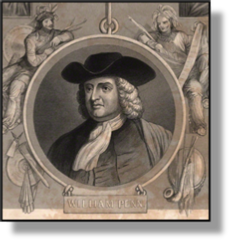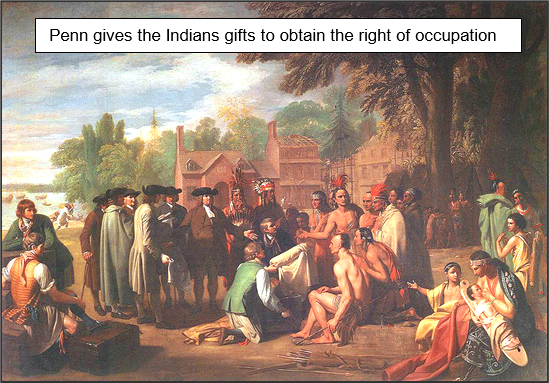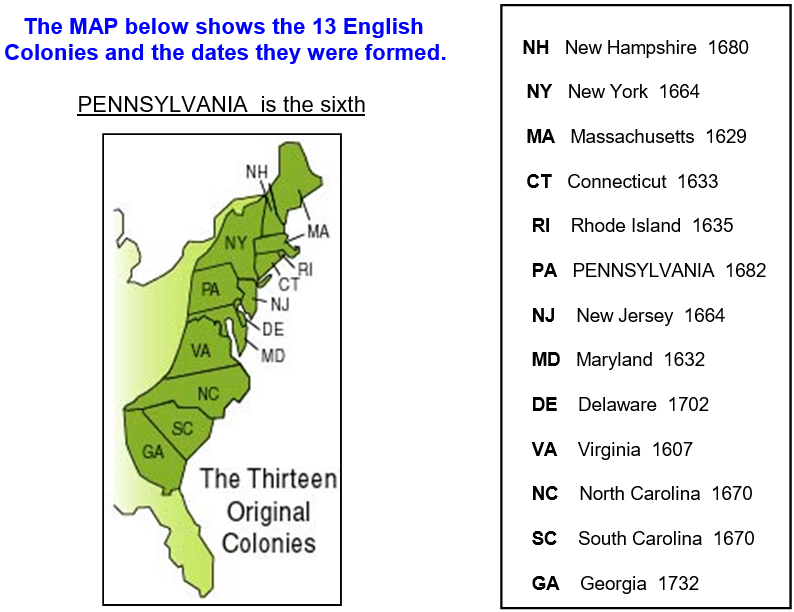


xxxxxThe Quaker William Penn spent some years in prison for his attacks on Protestant doctrine. During this time he wrote his No Cross, No Crown, a work upholding Puritan virtues and the Quakers’ dedication to social reform, and his The Great Cause of Liberty of Conscience, a powerful defence of toleration. He travelled widely as a Quaker minister, both at home and on the continent, and then in 1682, the king having granted him a piece of land in North America, he established the colony of Pennsylvania for Quakers and other persecuted minorities. He made a peace treaty with the local Indians and set up his “holy experiment”, a sound and fair system of government as he saw it, but quarrels soon broke out between different factions. He later made changes to the administration, but internal disputes continued. Meanwhile in England Penn had to fight off a charge of treason in 1688 -
WILLIAM PENN 1644 -
(C1, CW, C2, J2, W3, AN, G1)
Acknowledgements
Penn: line engraving, mid 19th century, artist unknown – National Portrait Gallery, London. Colony: by the American painter Benjamin West (1738-
 xxxxxWilliam Penn, the son of Admiral Sir William Penn, was born in London and attended Chigwell grammar school in Essex before moving to Ireland with his family. Here he listened to an itinerant Quaker preacher and became so interested in the Quaker movement that on going up to Christ Church, Oxford in 1660 he was later expelled for his non-
xxxxxWilliam Penn, the son of Admiral Sir William Penn, was born in London and attended Chigwell grammar school in Essex before moving to Ireland with his family. Here he listened to an itinerant Quaker preacher and became so interested in the Quaker movement that on going up to Christ Church, Oxford in 1660 he was later expelled for his non-
xxxxxOn his return to England, his treatise entitled The Sandy Foundation Shaken, questioning as it did Protestant doctrine, soon landed him in trouble. He was imprisoned in the Tower of London, and it was while there in 1669 that he wrote his No Cross, No Crown, a work of religious devotion in which he upheld Puritan virtues and the Quakers' dedication to social reform. He was no sooner out of the Tower than he was sentenced to six months at Newgate Prison. Once again he used his time to good effect, writing four treatises, including his well-
 xxxxxIn the 1670s he worked tirelessly as a Quaker minister, writing tracts, travelling the country and, with other leaders, visiting Holland and North Germany -
xxxxxIn the 1670s he worked tirelessly as a Quaker minister, writing tracts, travelling the country and, with other leaders, visiting Holland and North Germany -
xxxxxIn 1684 Penn returned to England to assist persecuted Quakers but, once again, found himself one of the persecuted. When William III came to the throne in 1688, he was accused of corresponding with his friend, the evicted King James II, and, as a result, was twice charged with treason. He was eventually acquitted, and then paid his second and last visit to Pennsylvania in 1699. He was obliged to restore good order following a period of mismanagement, and in 1701 issued his Charter of Privileges, introducing a new system of government based on a one chamber legislature. On his return to England he was cheated out of much of his money, and found himself in a debtor's prison for nine months. Meanwhile, the quarrels with the colonists continued, and in 1712, whilst negotiating the hand-
xxxxxOf his many publications, three are particularly worthy of mention. In 1693 he wrote An Essay Towards the Present and Future Peace in Europe in which he advocated an international organisation capable of ensuring peace by arbitration. In the following year he wrote a history of the Quaker movement, and in 1696 he drafted a plan for the future union of the American colonies, some ninety years before the drawing up of the American constitution.
xxxxxIncidentally, the colony of Pennsylvania was not named after the Quaker William Penn, but after his father, Admiral Sir William Penn -
C2-
Including:
Map of the Thirteen
English Colonies,
in America




